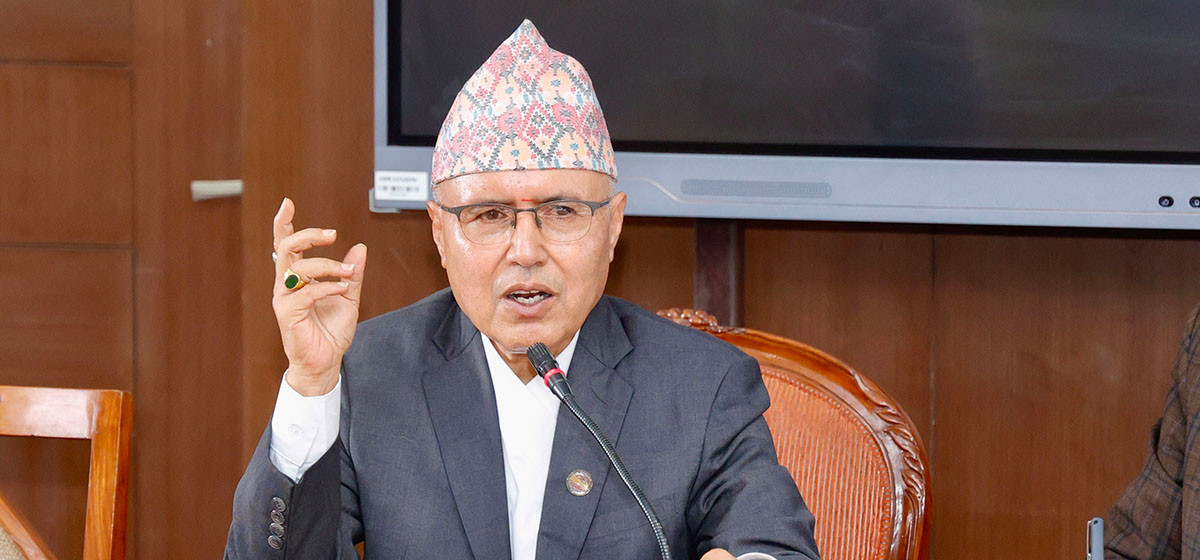KATHMANDU, Oct 7: Amidst the judiciary’s ongoing challenges, Prakash Man Singh Raut took charge as the 32nd Chief Justice (CJ) on Sunday, the same day former CJ Bishwoambhar Prasad Shrestha retired. Raut assumed office on Sunday after taking the oath of office from President Ram Chandra Paudel. The Parliamentary Hearing Committee (PHC) had approved Raut's nomination on Wednesday.
It is the first time since 2015 that a sitting justice has directly assumed the leadership of the judiciary on the same day the sitting CJ retired. On July 8, 2015, Kalyan Shrestha became the CJ on the same day that CJ Ramkumar Prasad Shah retired. Since then, seven judges did not receive timely appointments and became CJ after assuming office as the acting CJ. During this time period, Deepak Raj Joshi, who was recommended for CJ, had to relinquish his role as acting CJ after not being approved by the PHC.
Currently, the judiciary faces numerous challenges, including widespread complaints of corruption, irregularities, malpractices, and the influence of intermediaries. Delays in the delivery of justice are also a concern. Raut has taken charge of the judiciary amidst these challenges and public grievances.
CJ Raut, who entered the judiciary from legal practice, has already worked on drafting a five-year strategic plan for the judiciary based on recommendations from various study committees aimed at addressing the issues and malpractices within the system. Like previous Chief Justices, CJ Raut faces the major challenge of restoring public trust in the judiciary. He will serve as CJ until April 1, 2026.
Challenges
Complaints about delays in justice delivery, the influence of intermediaries in the courts, and issues of corruption, irregularities, and malpractices surface frequently these days. Reports from committees formed to recommend reforms in the judiciary have also highlighted these problems. However, the recommendations have remained limited to paper and have not been effectively implemented. The report submitted by the study committee led by former CJ Hari Krishna Karki has not yet been adopted by the full court of the Supreme Court. Karki has also since retired after serving as the CJ.
Govt attorney’s office to prosecute Secretary Raut

Implementing the reports will be a key challenge for CJ Raut. Even during his tenure of one month and 20 days as CJ, Karki was unable to implement the report. Similarly, outgoing CJ Shrestha, who succeeded Karki, was unable to implement most of the report’s recommendations.
The report includes various recommendations, such as preventing manipulations in judicial appointment nominations, making case management more scientific, and stopping the influence of intermediaries. Following these suggestions, a daily hearing schedule was introduced, starting from October 2021, through a lottery system. However, there is now a challenge in implementing “automated scheduling” for cases using this lottery process.
Judicial appointments
According to constitutional provisions, the CJ serves as the Chairperson of the Judicial Council. In his capacity as Chairperson, Raut faces additional challenges, including timely recommendations for judicial appointments, recommending candidates without a controversial background for the role of justice and judge, resolving complaints against justices promptly, and organizing the judicial transfer process.
The increasing number of cases and the decreasing number of justices have hindered the swift delivery of justice. This issue was also raised during Raut’s parliamentary hearing. Currently, there are five vacant judicial positions in the Supreme Court, and 14 vacant positions in the High Court.
Delay in the delivery of justice
It can take 15 to 20 years for some cases to reach a resolution. Delaying justice is considered as denying justice. The increasing backlog of cases at the Supreme Court poses another challenge, with over 25,000 cases currently pending. The newly appointed CJ needs to focus on ensuring justice that is swift and felt by the victims.
Non-cooperation of the Nepal Bar Association
The Nepal Bar Association has been conducting protests regarding the amendment of the Judicial Council regulations. The association threatened not to appoint judges until the regulations are amended.
Recently, a rule was amended to allow the Chief Registrar of the Supreme Court to be appointed as a High Court judge with seniority over existing judges. The Nepal Bar Association has protested this amendment, claiming it is unconstitutional. While Raut was still a judge, a task force was formed under his chairmanship to address this issue. However, due to a lack of consensus within the task force, the report was submitted with both minority and majority opinions. The bar association has stated that it will continue its movement until the amendment is withdrawn. Resolving this issue is not an easy task for the CJ.
Born in Udayapur, Raut was appointed as a justice of the Supreme Court in November 2016. He holds a law degree from Nepal Law Campus and has been in legal practice since 1983. Raut, who has expertise in civil, criminal, and constitutional law, entered the judiciary as a senior advocate.
Farewell to Shrestha
Bishwoambhar Prasad Shrestha served as the CJ from August 21, 2023, to October 5, 2024. Having entered the judiciary as a temporary officer, he worked his way up to the post of CJ. He ascended to the position through the acting process and made significant efforts to reform the judiciary during his tenure.
During his tenure, the issue of judicial appointment recommendations also became a challenge. After the Nepal Bar Association withdrew its cooperation, the expected recommendations for justices in the Supreme and judges in the High Courts were not made. As he was leaving, he recommended the appointments of Chief Judges Nripa Dhwoj Niraula and Nityanand Pandey to the Supreme Court. During his time, efforts were made to implement automated case hearings, establish family courts in some districts, and prioritize old cases. A farewell was held for Shrestha as he completed his term as CJ and retired.








































